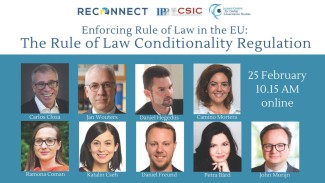Workshop: "Enforcing the Rule of Law – The Rule of Law Conditionality Regulation”
Evento online a través de Zoom (enlace para registro)
Presentado por Carlos Closa (IPP, CSIC) y Jan Wouters (U. Leuven), coordinador del proyecto RECONNECT.
ABSTRACT: The seriousness of the Rule of Law crisis, and specially the Polish and Hungarian governments illiberal practices, have led EU institutions to develop new and original instruments in order to tackle democratic backsliding, as the already existent Treaty mechanisms have proved to be insufficient. The Council and the European Parliament finally adopted at the end of 2020 the European Commission’s 2018 proposal aimed to link the disbursements of EU funds conditional to the Rule of Law compliance (Regulation 2020/2092). Even though the new regulation has created a milestone in the EU fight against the erosion of its fundamental values, it has not been exempted from controversy.
On the one hand, its adoption was marked by difficulties, such as the Hungarian and Polish governments veto threat to the MFF as a result of Council’s agreement to the regulation, later solved by EC’s President Ursula von der Leyen compromise to activate the mechanism only after the European Court of Justice decided on is legality. On the other hand, the delay in the launch of the mechanism opened tensions between the EC and the EP, as the latter increased pressure by suing the former to the ECJ for failure to act (Art.256 TFEU).
Moreover, the regulation has also received wide criticism on the part of several actors (including Rule of Law experts and scholars), as it has been considered to present important limitations. The fact that it only links the funds to Rule of Law offenses that compromise the financial interest of the Union prevent the regulation from having a systemic character. Furthermore, while “reversed qualified majority” was introduced in EC’s proposal, it was finally substituted by qualified majority as the Council’s decision method. Finally, the regulation does not provide a comprehensive list of what constitute breaches of the rule of law, but rather very general definitions.
Nonetheless, and spite of the highlighted flaws, the regulation is expected to mark a before and an after in the rule of law crisis. Not only the fact that most member states’ governments agreed with the regulation is already a triumph, since it demonstrates their compromise with fundamental values and the Union as a community of law while reinforcing at the same time EU’s constitutional character, but the regulation could also make the governments of Poland and Hungary to actually change their illiberal path, as they are highly dependent on EU money (indeed, they are the biggest beneficiaries of Union’s funds).
Consequently, and given the novelty of the instrument, there are several aspects to which heed attention. This RECONENCT workshop pursues to go deep on these issues by relaying on the expertise of both academics and stakeholders.
The workshop will be introduced by Jan Wouters (U. Leuven), coordinator or the RECONNECT project, and Carlos Closa (IPP-CSIC), leader of Workpackage 10 dedicated to Macroeconomic and Fiscal Governance. Two panels will follow. The first one explores the origins of the regulation and the process of the negotiation between EU institutions for its adoption, putting a special focus on the obstacles faced. The second panel is aimed to explore the future scope of the mechanism, although by considering the hurdle imposed by the delaying of its application and its consequences.



